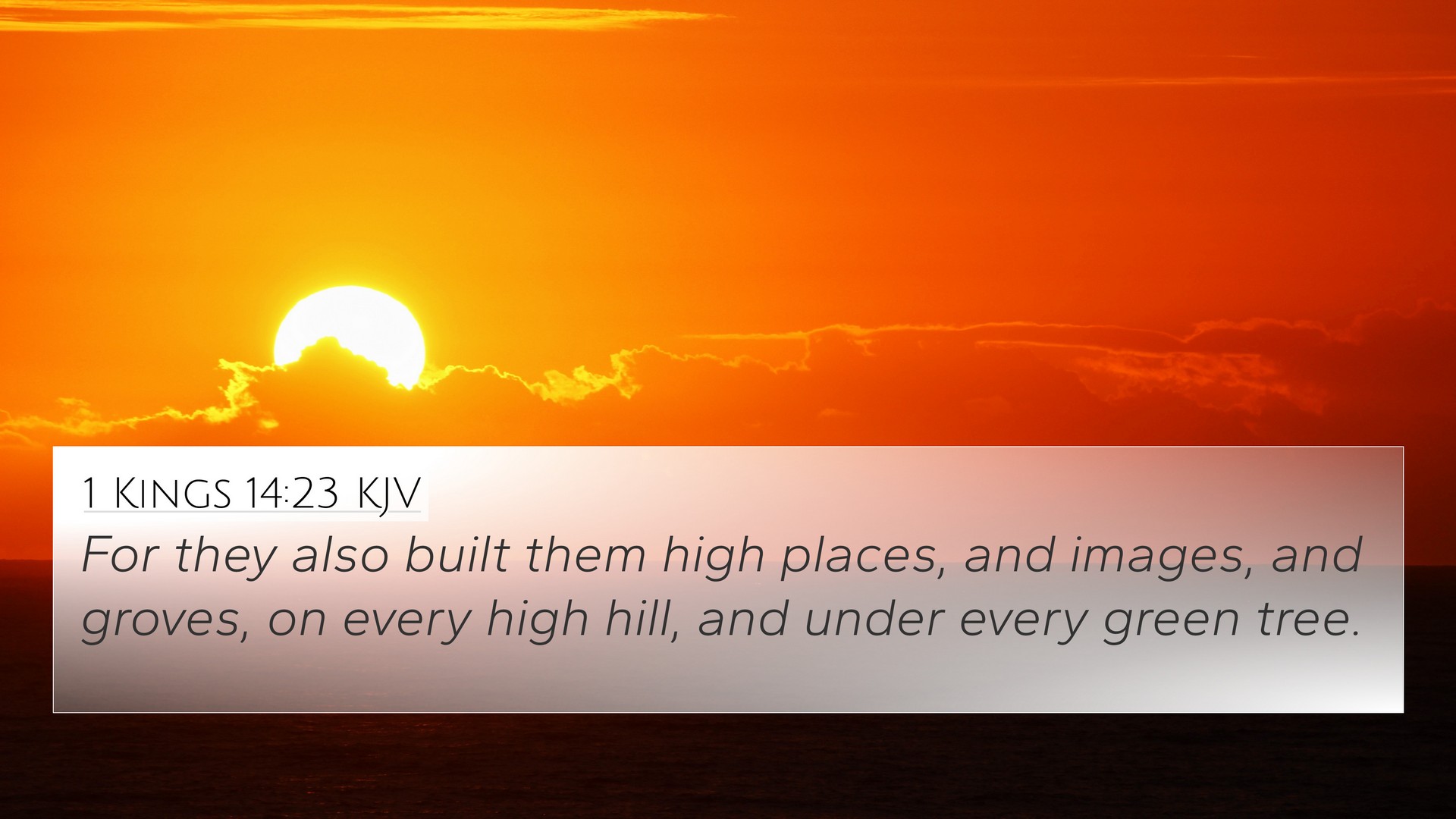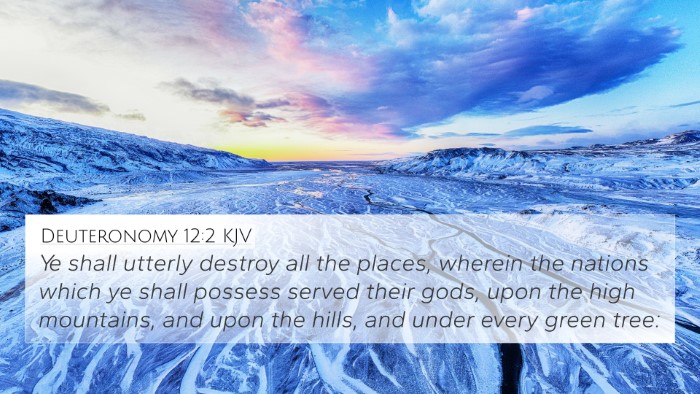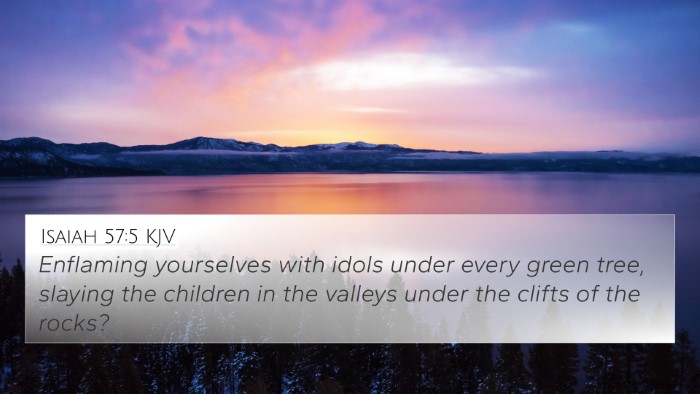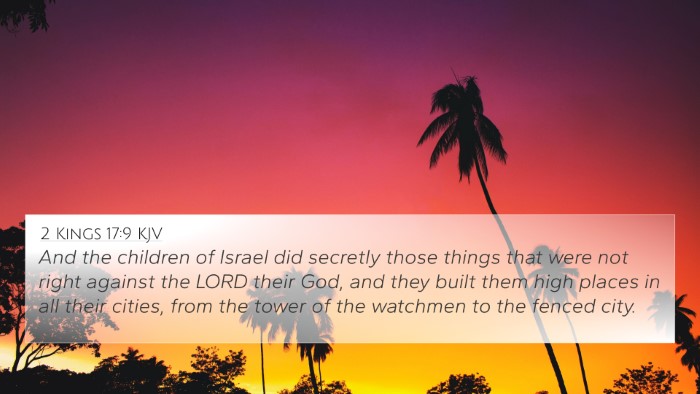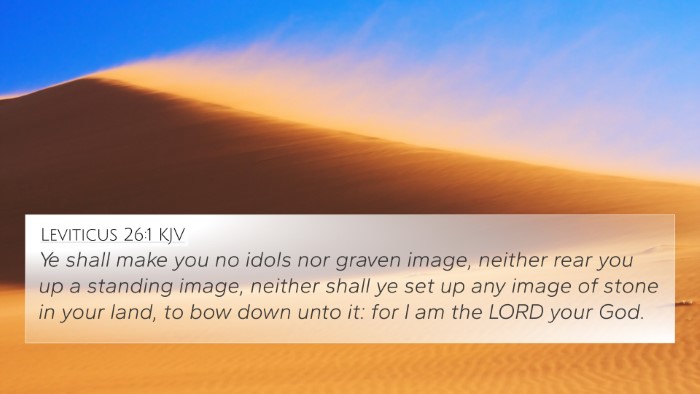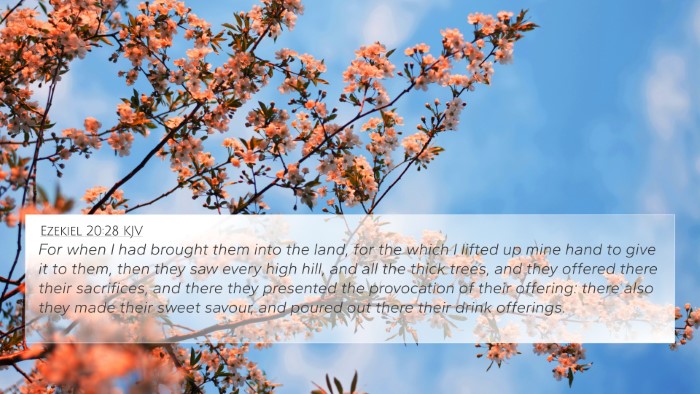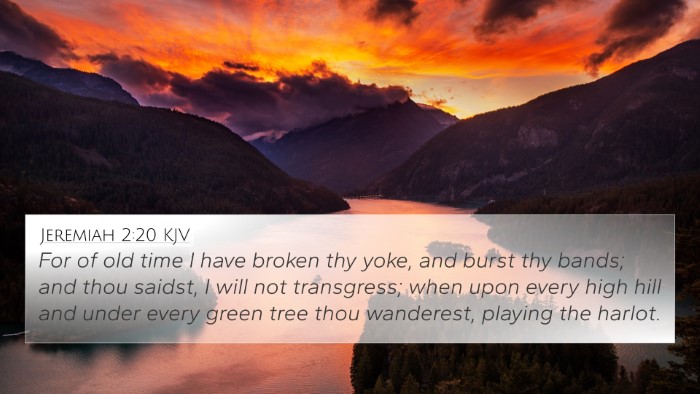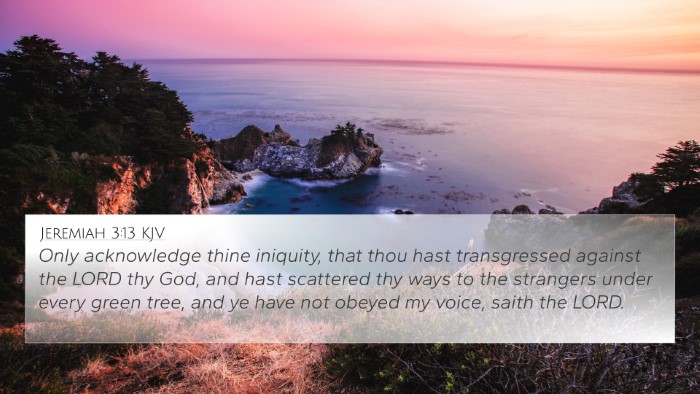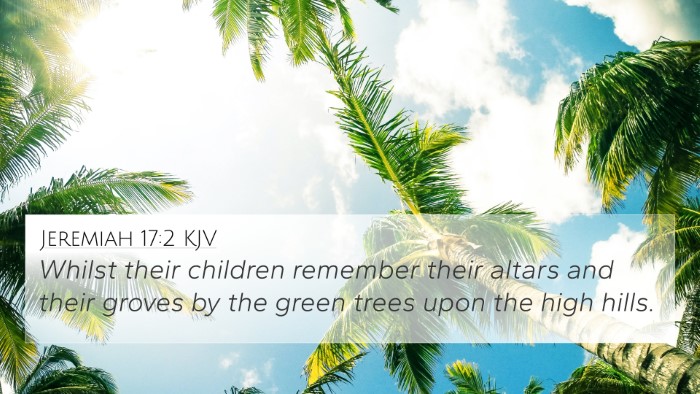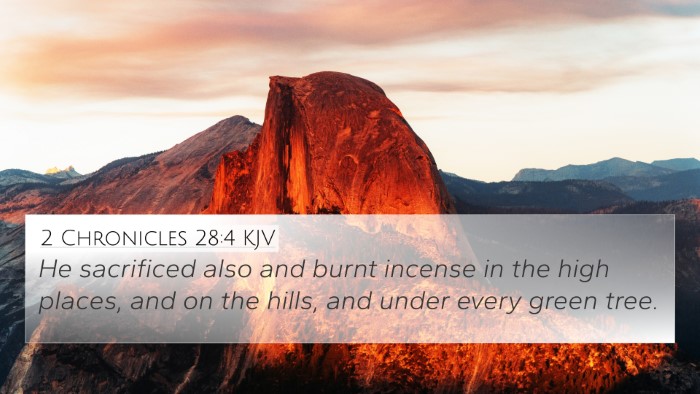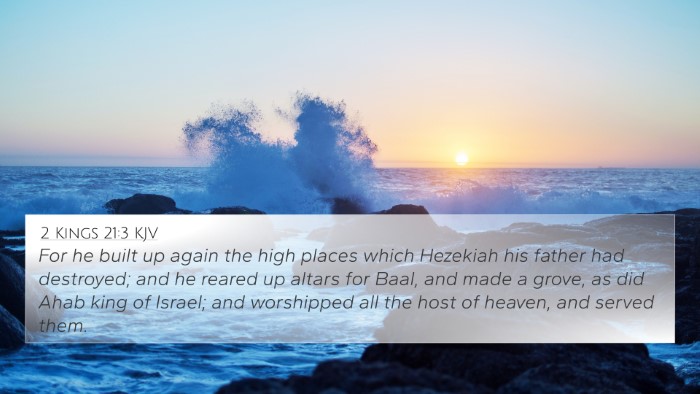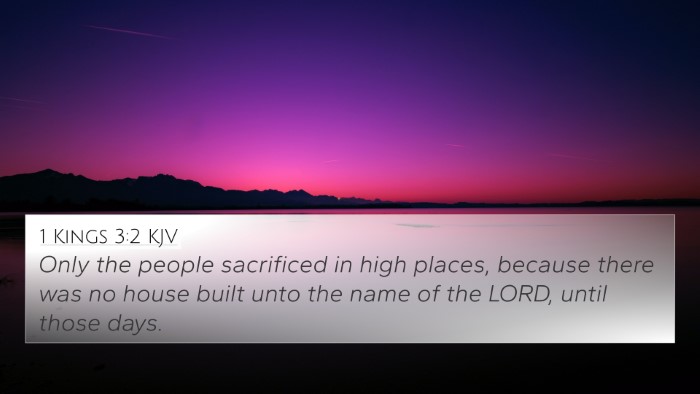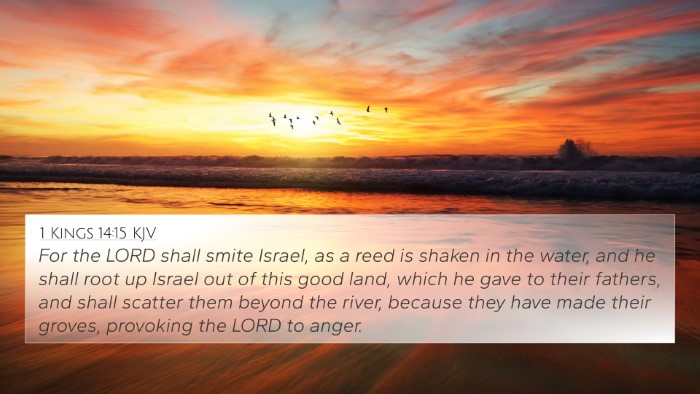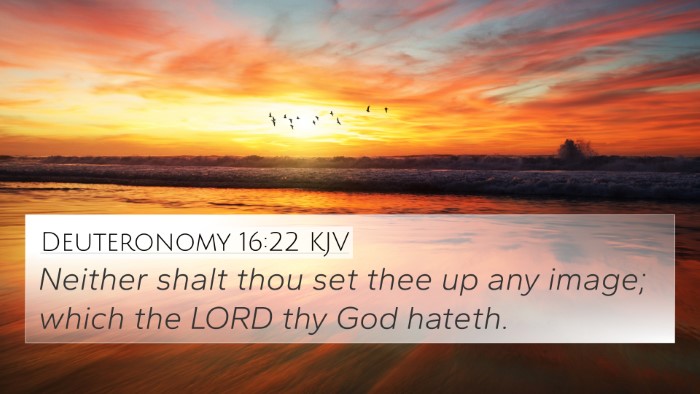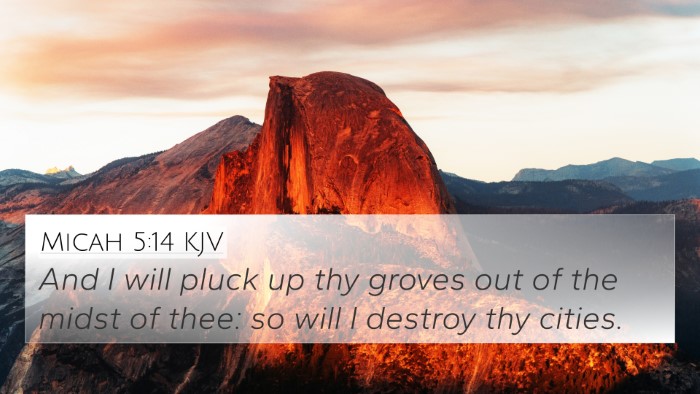Understanding 1 Kings 14:23
Verse (1 Kings 14:23): "For they also built them high places, and images, and groves, on every high hill, and under every green tree."
This verse highlights concerning behaviors observed in Israel during King Jeroboam's reign. The mention of "high places," "images," and "groves" indicates a pervasive idolatrous practice, demonstrating a significant spiritual decline among the people. Below is a detailed exploration of this verse's meaning derived from public domain commentaries, focusing on themes of idolatry, consequence, and biblical integrity.
Key Themes and Insights
- Idolatry and High Places: The construction of high places was a common practice in ancient Israel and often associated with pagan worship. Matthew Henry notes that these high places served as places of worship separate from the temple, leading the people away from Yahweh (Henry's Commentary).
- Cultural Influences: Adam Clarke emphasizes that these actions were influenced by surrounding nations who worshipped fertility gods, and King Jeroboam, seeking political stability, permitted these practices to appease the populace.
- Consequences of Sin: Albert Barnes draws attention to the inevitable consequences of turning away from God, arguing that this idolatry paved the way for future calamities and divine judgment upon Israel (Barnes' Notes on the Bible).
- Spiritual Decline: This practice shows a significant departure from true worship. Matthew Henry illustrates this as a clear violation of the commandments, which demanded exclusive worship to God (Exodus 20:3-5).
- High Hills and Green Trees: The locations of worship are also noteworthy, implying an attraction to nature in worship practices. Adam Clarke mentions how these settings were deemed sacred by the pagan cultures, which was an attempt to blend worship styles that were contrary to the faith prescribed by God.
Bible Verse Cross-References
To fully grasp the implications of 1 Kings 14:23, several related verses provide broader context, which can be connected through tools for Bible cross-referencing:
- Deuteronomy 12:2: "You must destroy completely all the places on the high mountains, on the hills and under every spreading tree where the nations you are dispossessing worship their gods."
- 2 Kings 17:10-11: "They set up sacred stones and Asherah poles on every high hill and under every spreading tree. At every high place they burned incense, as the nations whom the Lord had driven out before them had done."
- 1 Kings 12:30: "And this thing became a sin; the people went to worship before the one at Bethel and went as far as Dan to worship the other."
- Jeremiah 3:6: "During the reign of King Josiah, the Lord said to me, 'Have you seen what faithless Israel has done? She has gone up on every high hill and under every spreading tree and has committed adultery there.'
- Ezekiel 20:28: "When I brought them into the land I had sworn to give them and saw that they offered their sacrifices there and that they presented their odor of sweet savor there, I said to them: 'What is the high place to which you go?' So it is called Bamah to this day."
- Acts 17:16: (New Testament reflection on idolatry) "While Paul was waiting for them in Athens, he was greatly distressed to see that the city was full of idols."
- 1 John 5:21: "Dear children, keep yourselves from idols."
Comparative Bible Verse Analysis
Throughout the scriptures, a thematic dialogue emerges between true worship and idolatry. The connections between 1 Kings 14:23 and various scriptures show a pattern of rejection of God’s explicit commandments, leading to sin and separation from God. These inter-Biblical dialogues highlight the consequences faced by Israel due to the absence of faithfulness.
Linking Bible Scriptures and Thematic Connections
When considering how these verses interrelate, it’s crucial to evaluate the reasons behind these practices, the theological implications, and the warnings provided throughout scripture. Notably:
- Director interpretations of worship in the Old Testament directly contrast the teachings of the New Testament, focusing on the heart's posture (Romans 12:1).
- The prophets frequently warned about the consequences of abandoning Yahweh, reinforcing the importance of remaining true to God's covenant.
Conclusion
1 Kings 14:23 acts as a stark reminder of how easily one can be swayed by cultural influences to stray from God’s commandments. Through the development of a comprehensive Bible cross-reference guide, we can recognize the variety of texts that illuminate the consequences of idolatry and the importance of remaining faithful in worship.
This verse serves as both a descriptive historical account and a cautionary teaching applicable to believers today. By exploring connections between Bible verses and employing effective cross-referencing Bible study methods, believers are better equipped to understand and interpret their faith, aligning their worship practices with scriptural truths.
